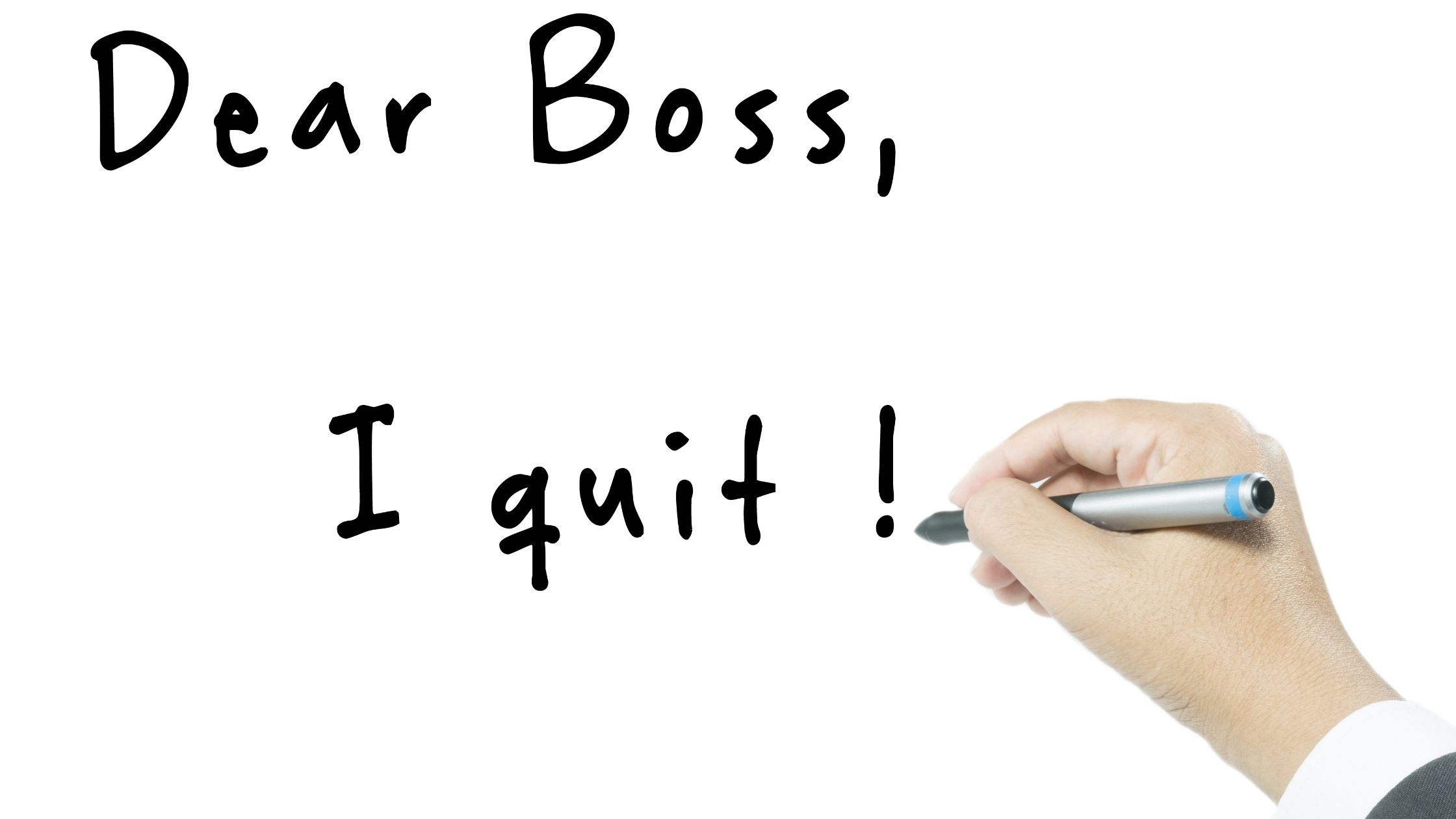Last Updated on November 2, 2020 by Emma @ Making and Saving Money
Quitting your job to start a business, or to focus on a ‘side hustle’ full time, has become a popular trend that many internet celebrities in the self-help field encourage.
For the majority of people it’s a bad decision. Why? Because this ethos encourages people to leave a stable income before they have anything to take its place. While you could be lucky and start something lucrative quickly, for most people, it will take years of hard work to come even close to their full-time income. If you’re in a job now, think about how long it took you to get to your current level and income.
However, there are some smart ways to make progress towards quitting your job in the future so that you can be your own boss fulltime, if that’s something you feel is right for you.
Disclaimer: This article may contain affiliate links. If you decide to use them, my blog may earn a small commission at no additional cost to you, which helps to fund more helpful articles for you to enjoy. Find out more in my Affiliate Disclosure. Nothing in this article constitutes financial, or other, advice. These are my views and the results of years of research, testing and learning.
Table of Contents
First, why do you want to quit?
The first step is to analyse what is driving you to want to quit your job, to make sure that quitting your job and starting your own business is the best way to achieve those goals.
If your motivation is to work less, then you could be in for a big shock. The average entrepreneur or business owner does not work the typical 9 am to 5 pm, especially in the early years while the business is gaining traction. It could be some time before you can afford to have a team or to delegate to outside sources.
If you’re motivated to quit your job to earn more money, then there are ways to do that within a job context such as applying for better-paid roles or seeking a promotion. Alternatively, if you are willing to put in the work, you could start a side hustle alongside your current position.
Alternatively, if you crave the freedom of setting your own schedule and calling the shots, then running a business, or some times of freelancing, can be a way to achieve this.
Decide on the lifestyle you would like to have
As part of your planning process, consider the lifestyle that you would like to have when you are your own boss. Would you like a simple life where you get away from it all? Do you want a luxurious lifestyle in a big city?
Not only could this motivate you to put in the work to get there, but it’s the first financial planning step to make your goals a reality. You may also spot opportunities to bring your current life, closer to your future ideal. For example, if you crave the freedom to travel more, would your employer support you to work remotely sometimes?
Calculate how much income you need to quit

Once you are clear on your ideal lifestyle, you can calculate how much income you need to generate from your business; that is the amount you will pay yourself, rather than the business’ profit.
This income is the number that you want to aim to have coming in for three to six months consistently from your business before you quit your job.
Decide on your perfect future business (and whether it’s actually a business)
Now that you know the financial realities of what you need to achieve, it’s time to think about what you would like to do, to earn this income.
If you search the internet for inspiration, be careful to avoid ‘get rich quick’ scams, which sadly are everywhere. These articles will help you to know what to look out for:
If you’re not sure, you could try out some side hustles first. You could also use the skills you use in your job to earn a side income freelancing through platforms such as Fiverr, Upwork or Bark.
Testing things out is the best way to get clear on what you want to do and the realities of doing it.
Think carefully before committing to any business that requires significant setup costs, as this increases your risks.
Start working on your business as a side hustle
The least risky way to test the waters in a new business, or when freelancing, is to start it as a side hustle while you are in fulltime employment. It’s good practice to check your employment contract first to make sure you will not be breaking the terms and conditions through this side hustle. For example:
- Most employers will not want you working on your side hustle using company equipment or during work hours
- Your work contract will likely stop you from working on anything that your employer classifies as competition with the company that employs you, for example, freelancing for a competitor.
If you are in doubt about what your contract allows you to do, it’s best to consult a legal professional to advise you.
Having a side hustle alongside a demanding job is tough.
If you’re not motivated to get up early to work on your business, to switch on your laptop when you get home, or to sacrifice some of your weekend, it’s a good sign that this is not something that you are going to have the motivation to do fulltime.
Create the option to quit your job
Dave Ramsey, a well-known financial coach in the US, recommends getting yourself out of debt and building up three to six months of savings to cover your expenses, to put yourself in the best position for any significant life changes.
Alongside this, you would want to see consistent earnings from your business that match your current earnings, or at least what you need to pay the bills in your desired lifestyle.
So, should you quit your job to run a business?
You can absolutely quit your job to run your own business, but make sure you have built a financially stable business or freelancing income before you leap. Having multiple streams of income also gives you stability and options if you lose your job.
Venturing into entrepreneurship with no financial safety net can be a lonely, stressful and miserable experience. In the worst-case scenario, if you decide it’s not for you, you may struggle to find another job quickly.
However, with some planning, you can have a smooth transition into your dream way to earn income and make a difference in the world. Some employers are also supportive of their employees decreasing their hours and become more part-time as they transition.
As long as you have the motivation and put in consistent effort, there is no limit to what you can achieve.
What do you think?
Do you agree with the points in this article?
Do you have experience of setting up your own business? What advice do you have for other people considering the same path?
If you enjoyed this article, you might like:




Lots of solid points to consider in this article and helpful information. I think at this point in our crazy world, there are many people who aren’t choosing to quit, rather their industry has taken a hard hit from COVID, and now they need to find other options. This is helpful information for that group of people who is trying to figure out the next steps on their life journey. These are all good questions for anyone to answer (no matter the reason) when considering taking the leap of starting your own business!
Thanks for your message, Aly. Yes, you are absolutely right; so many people are losing hours or jobs entirely. That’s why I find it helpful to build multiple streams of income through side hustles and investments – if one fails, then all is not lost.
You might also enjoy these articles:
Best Side Hustles in 2020
The Best Ways to Create Passive Income
I really would not leave my job to do my online business. I want a second income along with my first job. I think about needing healthcare so I am sticking with my current job along with my online business. It does sound tempting. Your post has a lot of information and yes I do agree that you need to make sure that you can quit and go full-time at your business sustainably. What you do about healthcare if you decide to quit your job?
I don’t have any experience in quitting I mean I thought about it but weighing the options, it doesn’t seem logical from my standpoint. Otherwise, very informational. People need to really save but six months (that’s a lot).
Hi Alicia, thanks for sharing your thoughts. Yes, six months of expenses is a lot to save up. Dave Ramsey recommends between three and six months depending on your circumstances, such as whether you have children, and how easy it would be for you to find another job.
If you’d like some inspiration on saving money, you might find the following articles helpful:
Tips to Start Saving Money
How to Save Money on Car Insurance in the UK
Tips to Save Money on Home Insurance
At a point in our lives, we would usually have this question to ask ourselves and we do not know whether or not to go all in and quit that job it whether it is better to start our own business. But I think we need to weigh out options carefully before making this decision because it’s not something one can jump into. If there’s a business that’s surely profitable like an online business then why not.
Thanks for your message Jackie.
In my case I had an option to get out and leave with a redundancy package. I had offers of two jobs within the company who took us over but turned them down.
I wanted to get out of the routine of being away from home around 100 days per year
Being self employed is a bit of a cultural shock but I was fortunate in that I knew a few contacts who were looking for assistance with their projects
It kept me on my toes as I had to learn new skills quickly
Fortunately it all worked out fine
The situation now is quite dire and it’s extra risky making the transition from stable income to uncertain income.
Having been self employed I would never have wanted to go back to working for a large company again
Thank you for sharing your story, Derek. I can understand your motivations for accepting a redundancy package, with that amount of travel. It sounds like you found new ways to monetise your skills as a self-employed professional, which is great.
A redundancy package can definitely financially smooth the way into working for yourself and give some time to test the waters of working in a new way.
I wish you all the best!